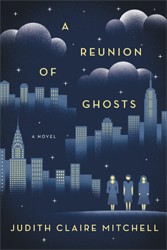Earlier this week, Judith Claire Mitchell wrote about her thoughts on autobiographical novels and her two decades living in the Midwest as a “passing” Jew. The author of A Reunion of Ghosts and The Last Day of the War, Judith is an English professor at the University of Wisconsin-Madison where she directs the MFA Program in Creative Writing. She has been blogging here all week for Jewish Book Council’s Visiting Scribe series.
 Q: How can you tell if a man is Aryan?
Q: How can you tell if a man is Aryan?
A: He’s Aryan if he has the towering height of Goebbels, the slim physique of Goering, and the blond good looks of Hitler.
Okay, okay, it’s not the funniest joke you’ve ever heard. But it killed in 1944, and in more ways than one: If you lived in Nazi Germany, telling it could have cost you your life. Political jokes were essentially illegal in the Third Reich, and you could actually be hauled in to a so-called joke court for telling one. Punishment ranged from imprisonment to death.
Needless to say, this attitude toward jokes wasn’t unique to that rancid regime. Remember Seth Rogan and James Franco’s run-in with North Korea? Very few dictators, it turns out, are fans of skewering wit. That’s why Elie Wiesel says, “The best answer to fanaticism is a sense of humor.”
It’s true that humor is a formidable weapon. It’s also the only weapon I can think of that simultaneously flays the oppressor and provides sustenance to the oppressed. The persecuted, the denigrated, the outcast, those whose humanity is systemically dismissed, denied, or snuffed out, have always told these kinds of jokes even in the face of prison or worse, just as the starving have always stolen bread. The latter provides essential nourishment for the body; the former, it seems, provides essential nourishment for the spirit. Both food and humor turn out to be human necessities.
The food and the humor also happen to be two of my favorite things about being Jewish. We’re much more than those things, of course. But still…nova on bagels and Groucho Marx, Seinfeld and kasha knishes. What’s not to love?
When my agent was pitching A Reunion of Ghosts to editors, he described it as a funny book about suicide. Me, I’d have tweaked that description a little. I see Reunion as a very serious book about the twentieth century as embodied in the stories of four generations of a single family, some members based on historical persons and others of my own invention. The book is about suicide, yes, but it’s just as much about war and random gun violence and cancer and AIDS and genocide and diaspora and alcoholism and isolation and mental illness and sexism and assassination and bigotry and the human capacity for cruelty and pretty much everything else that can go wrong as we make our way through this Vale of Tears.
But I also knew that the narrators of this story would be sisters for whom humor was simultaneously weapon and comfort. They’d love puns and word play. They’d make jokes in the midst of grief and defeat. They’d invent riddles like this one:
Q: Where can you run into all the suffering souls of this sorrowful world?
A: At a Job’s fair
We are all, even the most blessed of us, versions of Job. Even the luckiest of us suffer unfathomable loss. There’s not a one of us who doesn’t die in the end.
Yet despite everything, most of us find opportunities to laugh. Bad jokes. Puns. Cat videos.
A generous reviewer has said that A Reunion of Ghost “may sound unutterably bleak…but the novel is not, and it’s filled with…humor.” When I first read those words, I couldn’t help notice that they don’t only describe my novel. They also describe life.
“Praise to life,” writes the poet Adrienne Rich, “though its windows blew shut on the breathing-room of ones we knew and loved.” Sooner or later the windows will blow shut on our own breathing-rooms, too. We know this. And yet, despite that death sentence, we form friendships and fall in love and raise children and are drawn to art and movies and literature, and we tell jokes and we laugh. With full knowledge of how all this will end, we are silly and irreverent. In the face of annihilation we are comedians.
Praise to life! And pass the knishes.
A graduate of the Iowa Writers Workshop, Judith Claire Mitchell has received fellowships from the James Michener/Copernicus Society, the Wisconsin Institute for Creative Writing, the Arts Institute of the University of Wisconsin, and elsewhere. She currently lives in Madison with her husband, the artist Don Friedlich.
Related Content:
- The Book of Job by Harold S. Kushner
- The Big Book of Jewish Humor: 25th Anniversary Edition by William Novak
- Heir to the Glimmering World by Cynthia Ozick
Judith Claire Mitchell is an English professor at the University of Wisconsin-Madison, where she directs the MFA Program in Creative Writing. A graduate of the Iowa Writers Workshop, Mitchell has received fellowships from the James Michener/Copernicus Society, the Wisconsin Institute for Creative Writing, the Arts Institute of the University of Wisconsin, and elsewhere. She currently lives in Madison with her husband, artist Don Friedlich.



